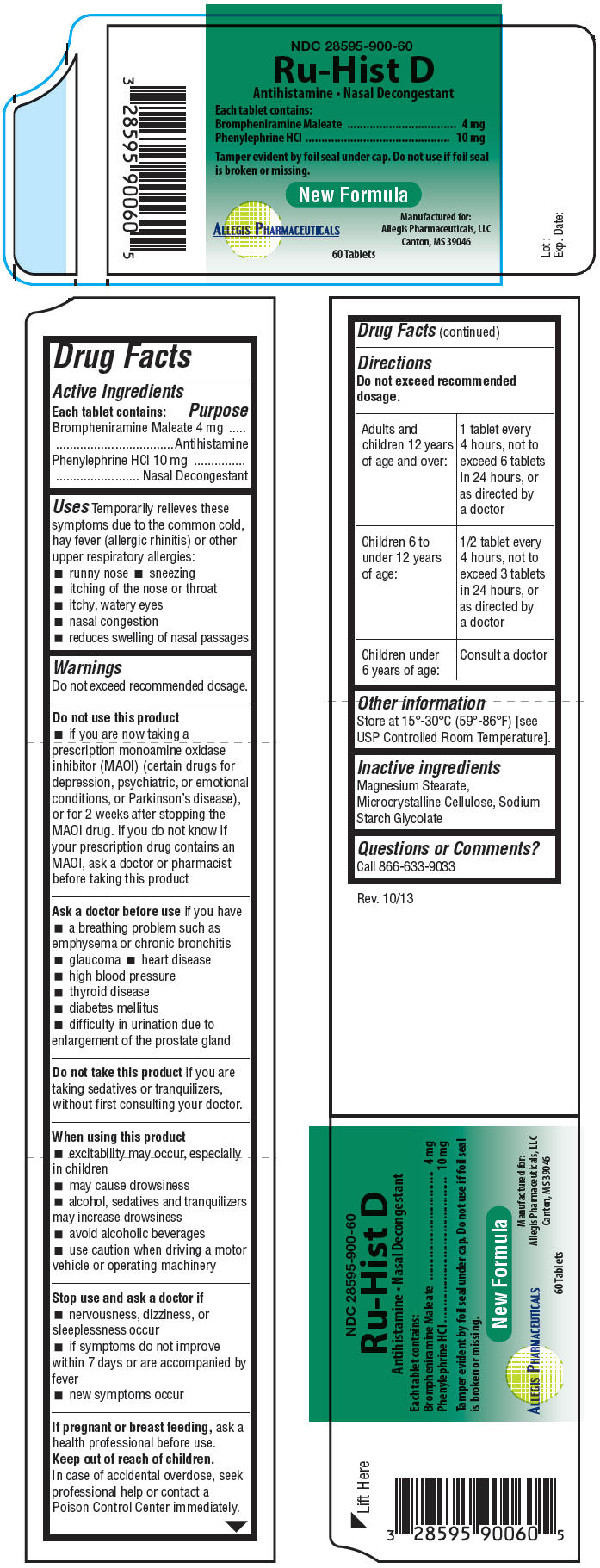Ru-hist D | Brompheniramine Maleate And Phenylephrine Hydrochloride Tablet while Breastfeeding

What is Ru-hist D | Brompheniramine Maleate And Phenylephrine Hydrochloride Tablet ?
Purpose: Active Ingredients Each tablet contains: Purpose Brompheniramine Maleate 4 mg Antihistamine Phenylephrine HCl 10 mg Nasal Decongestant
Is using Ru-hist D | Brompheniramine Maleate And Phenylephrine Hydrochloride Tablet safe or dangerous while breastfeeding?

Ru-hist D | Brompheniramine Maleate And Phenylephrine Hydrochloride Tablet Breastfeeding Analsys
Brompheniramine maleate while Breastfeeding
Low RiskCAS Number: 980-71-2
First generation antihistamine, alkylamine drug, sedative with antimuscarinic effect. Described irritability, crying and insomnia in a baby from a nursing mother after taking a preparation compounded by Iso-ephedrine and brompheniramine that were possibly responsible for the symptoms.Check up the occurrence of drowsiness and inappropriate feeding of the infant. Likely inhibition of breastfeeding in the first weeks after birth due to anti-prolactin effect. It is not recommended bed-sharing with the baby if you are on this medication.
Phenylephrine hydrochloride while Breastfeeding
Low RiskCAS Number: 59-42-7
Used on topical decongestant solutions for nose drops at low concentration. 10% midriatic eye drops are available. Because low concentration is used on nose and ophtalmic drops a significant excretion into breast milk is unlikely. Low oral biodisponibility minimizes any risk of harmful effect in the infant. Authorized for nasal or ophtalmic use on children aged younger than 1 year. Although on latest update relevant data on breastfeeding was not found it is considered to be safe when minimal dose is used. Avoid excessive or long term use. A related drug Pseudoephedrine can inhibit milk production. It would be advisable to press on the lachrimal sac to minimize absorption.
Ru-hist D | Brompheniramine Maleate And Phenylephrine Hydrochloride Tablet Breastfeeding Analsys - 2
Brompheniramine maleate while Breastfeeding
CAS Number: 86-22-6
Small, occasional doses of brompheniramine would not be expected to cause any adverse effects in breastfed infants. Larger doses or more prolonged use may cause effects in the infant or decrease the milk supply, particularly in combination with a sympathomimetic such as pseudoephedrine or before lactation is well established. Single bedtime doses after the last feeding of the day may be adequate for many women and will minimize any effects of the drug. The nonsedating antihistamines are preferred alternatives.
Phenylephrine hydrochloride while Breastfeeding
CAS Number: 59-42-7
The oral bioavailability of phenylephrine is only about 40%,[1] so the drug is unlikely to reach the infant in large amounts. However, intravenous or oral administration of phenylephrine might decrease milk production. Because no information is available on the use of oral phenylephrine during breastfeeding, an alternate drug may be preferred, especially while nursing a newborn or preterm infant.Phenylephrine nasal spray or ophthalmic drops are less likely to decrease lactation. To substantially diminish the effect of the drug after using eye drops, place pressure over the tear duct by the corner of the eye for 1 minute or more, then remove the excess solution with an absorbent tissue.
I already used Ru-hist D | Brompheniramine Maleate And Phenylephrine Hydrochloride Tablet and meanwhile I breastfed my baby should I be concerned?
Ru-hist D | Brompheniramine Maleate And Phenylephrine Hydrochloride Tablet is in the category of low risk, if you have already used it then its not a big deal if health and behavior of baby is good. However your health care provider shall be aware of the fact that you have used Ru-hist D | Brompheniramine Maleate And Phenylephrine Hydrochloride Tablet so you should inform him based on your convenience.
My doctor has prescribed me Ru-hist D | Brompheniramine Maleate And Phenylephrine Hydrochloride Tablet, what should I do?
Though Ru-hist D | Brompheniramine Maleate And Phenylephrine Hydrochloride Tablet dose not comes in category of safe drugs rather it comes in category of low risk but if your doctor is aware that you are breastfeeding your baby and has still recommended it then its advantages must be outweighing the risks.
If I am using Ru-hist D | Brompheniramine Maleate And Phenylephrine Hydrochloride Tablet, will my baby need extra monitoring?
Not much monitoring required while using Ru-hist D | Brompheniramine Maleate And Phenylephrine Hydrochloride Tablet
Who can I talk to if I have questions about usage of Ru-hist D | Brompheniramine Maleate And Phenylephrine Hydrochloride Tablet in breastfeeding?
US
National Womens Health and Breastfeeding Helpline: 800-994-9662 (TDD 888-220-5446) 9 a.m. and 6 p.m. ET, Monday through Friday
UK
National Breastfeeding Helpline: 0300-100-0212 9.30am to 9.30pm, daily
Association of Breastfeeding Mothers: 0300-330-5453
La Leche League: 0345-120-2918
The Breastfeeding Network supporter line in Bengali and Sylheti: 0300-456-2421
National Childbirth Trust (NCT): 0300-330-0700
Australia
National Breastfeeding Helpline: 1800-686-268 24 hours a day, 7 days a week
Canada
Telehealth Ontario for breastfeeding: 1-866-797-0000 24 hours a day, 7 days a week
